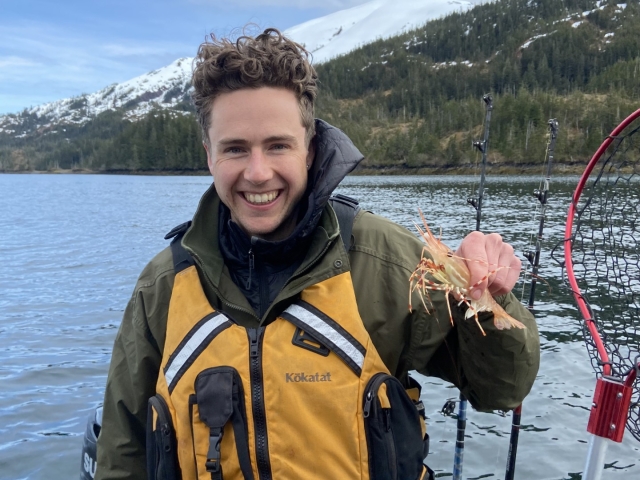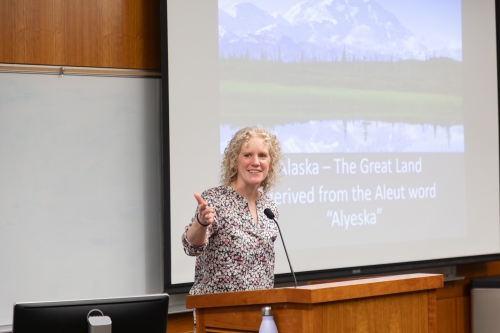King Hall Strengthens Longtime Ties to Alaska's Courts

By Carla Meyer
Nolan Gerlach ’23 took an unusual route to practicing law in his home state.
Now a clerk for Alaska Supreme Court Associate Justice Jennifer Henderson, Gerlach was born in Anchorage but moved around with his father’s Air Force posts before settling in Dixon, California for high school.
Gerlach’s subsequent decision to stay close for college, by attending nearby UC Davis for undergrad and law school, provided an unexpected path back to the 49th state, or “the place my parents would talk about as home,” he said.
For more than 50 years, UC Davis has sent judicial clerks 3,000+ miles northwest to Alaska. Each year, an Alaska state court representative visits Davis to interview students, following a tradition long upheld by the late Alaska Supreme Court Chief Justice and King Hall alum Craig Stowers ’85. For the past few years, Henderson has made the trip.
“The energy the students seem to have about engaging with a new community in Alaska is always really impressive,” Henderson said of King Hall students. “The qualities I tend to see in them are a sense of adventure, excitement about learning new areas of law, and then a dedication to writing as well.”
Gerlach, for instance, has been “an excellent writer and an excellent editor,” she said.
Current King Hall clerks in Alaska also include Cobi Furdek ’24, Raquel Rodriguez-Walmisley ’24 and Katie Crawford ’24. This fall, Christopher Martinek ’25 will clerk for Supreme Court Justice Jude Pate and Andrew Willis ’25 for Justice Aimee Oravec.
Also this fall, Gerlach will start work as an assistant Anchorage district attorney, after completing two year-long clerkships, the first with Superior Court Judge and Davis alum Jack McKenna ’07.
“I reached out to him in my 1L year,” Gerlach said, after inquiring with Career Services about Alaska alums. Although his parents are staying put in Northern California, Gerlach always wanted to spend more time in Anchorage, where both sets of grandparents live.
Gerlach and McKenna, a top state prosecutor before taking the bench in 2021, quickly found common interests in and outside the law. “We both like cycling -- he knew all the cycling routes around Davis,” Gerlach said.
Access to nature is a big component of the Alaska courts’ experience. “It is so easy to get out and enjoy the outdoors from here,” Gerlach said during a phone interview, noting his current view of the Chugach mountains from Anchorage’s Boney Courthouse. Clerks hike and fish after work in summer, and judges hunt in fall, much like the Alaskans whose cases they hear.
“I think that it’s good that the people practicing the law here understand the lives of the people they make decisions about,” Gerlach said.
Gerlach’s clerkship with McKenna completed a Davis-Alaska circle: McKenna once clerked for Superior Court Judge Michael Spaan ’72, who had clerked for Supreme Court Justice Robert Erwin. A member of Davis’ fourth-ever graduating class, Spaan was the law school’s first clerk in Alaska, which is barely older than King Hall, having become a state in 1959.
A year after Spaan led the way, Charles Bird ’73 clerked for Alaska Supreme Court Justice (later Ninth Circuit Judge) Robert Boochever, coming away so impressed he later endowed Davis’ Boochever and Bird Chair for the Study and Teaching of Freedom and Equality, now held by Professor Ashutosh Bhagwat.
Stowers also clerked for Boochever, whom he met through King Hall founding faculty member Daniel Fessler, who had enlisted his star student to help him work on what became the Alaska Corporations Code. Stowers’ storied Alaska career would include 11 years on the Supreme Court. He visited UC Davis most of those years, when it was just one of three California law schools, with Berkeley and Stanford, on the itinerary.

Henderson said she always knew of an enduring Anchorage-Davis connection, and the key role Stowers, who died in 2022, played in sustaining it. Although they never worked in the same court, “he was technically the person in charge” early in her judicial career in lower Alaska courts. “He is just one of those figures who was always there, and really warm and personable, and made a really strong connection when I was a brand-new judge.”
The Alaska courts have hired more than 100 clerks from King Hall, four of whom – Spaan, Stowers, McKenna and U.S. District Court Chief Judge Sharon Gleason ’83 – later took the bench.
Career Services Associate Director and King Hall alum Natalie Butcher ’08 also clerked in Alaska, for then-Superior Court Judge John Suddock. The experience gave Butcher special insights into advising students on clerkships.
“It’s really just amazing to go to Alaska for a year and to get that really specialized legal experience as a law clerk, and also just be in such a unique environment,” Butcher said.
That “specialized” experience includes working within a comparatively dynamic legal framework.
“We have less that is clearly defined and laid out in precedent and more arguments that push at what the limits are of certain statutory provisions or certain constitutional provisions,” Henderson said. “That’s exciting to law students when they’re thinking about where they might want to work. It’s exciting for us, too, as practitioners and judges.”
Studying and writing about what’s enshrined elsewhere but “is being decided for the first time here” is “part of the fun” of his clerkship, Gerlach said. “Also, here in Alaska, there’s three sovereigns at work: State courts, federal courts, and tribal courts, which are pretty robust and developing in their own way.”
His Supreme Court duties include “reviewing work that is pretty close to being published, checking factual and legal assertions,” he said. “That is where I have learned the most volume of information, reading a 20-page decision about a type of law you know nothing about.”
His Superior Court clerkship involved more courtroom work, Gerlach said. He reviewed evidence and arguments so he could craft orders for the judge, sometimes served as a bailiff, and even performed weddings.
His alma mater’s close connection to Alaska has been a great conduit for learning more about the law – and to becoming better acquainted with his extended family in Anchorage.
“It’s been really cool to get to know my mom’s parents and my dad’s parents and my mom’s sisters,” Gerlach said. After a peripatetic childhood, “I have family within a 11-mile radius wherever I go now.”
